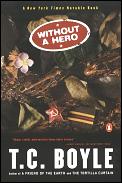 This book review was originally published in the Baltimore City Paper on June 1, 1994.
This book review was originally published in the Baltimore City Paper on June 1, 1994.
Am I the only one who feels that T. Coraghessan Boyle deserves caning?
Boyle has made my short list of authors who deserve some punishment since I flipped through his story collection Greasy Lake (1985), which characteristically teeters between hilariously brilliant and pungently annoying. With his opium-addict book jacket photos and his cooler-than-thou narrative attitude, Boyle is the embodiment of the undisciplined genius. He’s the child prodigy you remember from junior high school that spent hours scribbling bawdy poems about the history teacher instead of channeling his energies into something more productive.
Boyle’s last two novels, East Is East and the truly inspired The Road to Wellville, with their sardonic treatments of crossed cultures and self-assured con men, promised some greater aim for Boyle’s talents. The author clearly has a skewed view of America, a piercing view targeted at the self-appointed guardians of humanity who all too often turn out to be hucksters for a line of the emperor’s new clothes. Not to mention that Boyle possesses a truly impressive vocabulary and a genuinely original prose style.
The story collection Without a Hero, however, once again demonstrates Boyle’s uncanny ability to squander his God-given resources. Like most of his earlier story collections, it’s a grab bag of both keen insights into the American ethos and botched attempts at politically incorrect satire.
Nowhere is Boyle’s talent more evident than in “Filthy with Things,” wherein sleek con woman Susan Certaine takes advantage of a couple’s preoccupation with white, middle-class guilt over having too many possessions. It’s gut-wrenching to watch Certaine work her black magic on bourgeois Julian Laxner, promising that taming his Western acquisitiveness will lead to fitness of the soul. “I am the purifying stream, Mr. Laxner,” she tells him, “that’s who I am. The cleansing torrent, the baptismal font. I’ll make a new man out of you.”
But alongside gems like “Filthy with Things” and the title story (which is as much about the love of material goods as the love between its American and Russia protagonists), we get the truly puzzling “Beat,” about a beatnik-wannabe’s run-in with Jack Kerouac, the anti-animal rights activism “Carnal Knowledge,” and “Big Game,” an ironic rewrite of Hemingway’s “The Short Happy Life of Francis Macomber” with an added dimension that’s thin as particle board. Often Boyle’s stories resort to the juvenile trick of the ironic twist, a tactic that’s as disappointing as it is lazy.
T. Coraghessan Boyle is a good novel writer who’s certainly proven that he can work wonders when he sets his mind to it, but his short stories are a completely hit-or-miss affair. Without a Hero sits alongside Boyle’s other works as an exercise in unkempt imagination desperately in need of discipline.